 The financial performance of Hilton Worldwide Holdings Inc. has been driven by revenue growth from increased procurement volume and vendor rebates, supporting business expansion. Operating expenses have risen due to higher procurement costs, impacting net income negatively. Management is focusing on expanding the global hotel network despite economic challenges, utilizing return on invested capital and cash availability as key metrics. HLT faces risks from market volatility and legal proceedings but maintains controls to mitigate these risks. With stable key performance indicators and a strategic focus on growth, Hilton is navigating challenges to enhance market presence and profitability.
The financial performance of Hilton Worldwide Holdings Inc. has been driven by revenue growth from increased procurement volume and vendor rebates, supporting business expansion. Operating expenses have risen due to higher procurement costs, impacting net income negatively. Management is focusing on expanding the global hotel network despite economic challenges, utilizing return on invested capital and cash availability as key metrics. HLT faces risks from market volatility and legal proceedings but maintains controls to mitigate these risks. With stable key performance indicators and a strategic focus on growth, Hilton is navigating challenges to enhance market presence and profitability.
Executive Summary
Financials
Revenue growth has been increasing steadily over the past three years, primarily driven by increased procurement volume and vendor rebates. This growth has been crucial for supporting business needs and expanding the global hotel network. Operating expenses have increased due to higher procurement costs from purchasing operations, especially for properties outside the system. There are significant changes in cost structures, mainly driven by payroll, compensation, and transaction costs for acquisitions. The company’s net income margin is negative, showing a decline. It compares unfavorably with industry peers who likely have positive margins.
Management Discussion and Analysis
Management has focused on expanding the global hotel network and development pipeline to drive growth. The current economic challenges have led to delays in openings and new developments, impacting profitability. Management assesses the company’s competitive position by focusing on return on invested capital and cash availability. They are experiencing challenges due to economic conditions like inflation and interest rates. They aim to grow by expanding their global hotel network through a development pipeline. Management identified market risks and controls as major challenges. Mitigation strategies include using derivative financial instruments and maintaining disclosure controls and procedures to reduce volatility and ensure timely disclosures.
Key Performance Indicators (KPIs)
Risk Assessment
The top external factors that pose risks to the company operations and financial performance include market volatility, regulatory changes, and legal proceedings. These factors can impact the company’s results of operations and cash flows. HLT maintains disclosure controls and procedures to ensure timely decisions on cybersecurity risks. They use derivatives to reduce volatility but not for speculation. They believe they have adequate reserves against potential risks. HLT is involved in various legal proceedings, but believes it has adequate reserves. It does not expect these issues to have a material adverse effect on its financial position, results, or cash flows. HLT maintains disclosure controls and procedures to ensure timely reporting.
Corporate Governance and Sustainability
The board of directors of Hilton Worldwide Holdings Inc. consists of unspecified members. There is no mention of any notable changes in leadership or independence in the provided context information. HLT does not explicitly address diversity and inclusion in its governance practices and does not mention a commitment to board diversity. HLT focuses on reducing volatility in operations through derivative instruments. It maintains effective disclosure controls and procedures. It also addresses legal proceedings responsibly, believing they won’t significantly impact financials.
Forward Guidance
The company’s forward-looking guidance aligns with its strategic initiatives outlined in the annual report, focusing on reducing volatility in results and cash flows. This supports the goal of maintaining stable financial performance in the face of market risks. HLT is factoring in trends such as inflation, interest rates, labor shortages, and supply chain disruptions into its forward-looking guidance. It plans to capitalize on these trends by focusing on managing risks, expanding globally, and enhancing its technology systems. HLT is focused on expanding its global hotel network through a development pipeline, indicating a commitment to long-term growth and competitiveness in the hospitality industry. This strategic shift demonstrates a dedication to enhancing market presence and profitability.
For more information:
This article was created using artificial intelligence technology from Klickanalytics.
